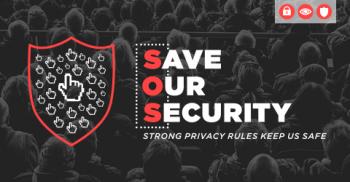Bill C-51 is creating new legacies in Canada. Our freedom of expression, our right to privacy, and our personal security are all undergoing frightening shifts.
But perhaps the greatest legacy of C-51 threatens to be this: a succession of failures by successive governments to listen to Canadians.
As Parliament's public safety committee recently concluded a jam-packed week of public consultations on C-51 and privacy, high hopes for this latest promise to finally listen to our feedback faded fast.
It's fair enough. Skepticism that this was little more than a box-ticking exercise was fuelled by the committee's apparent disinterest in effectively publicizing the consultation dates. Those were only made public just 10 days in advance, leaving community groups scrambling to pick up the slack and publicize the details.
And across the nation, people who did make it out to the in-person consultations reported "utterly demoralizing" scenes of empty chairs, jetlagged and glaze-eyed committee members, and pointed questions being met with silence.
And there we go -- a consultation was held, people came, and they made their points in their allotted three minutes before their mics were cut to move on to the next person. Have we now been truly consulted?
After all, what makes a consultation a consultation? Fundamentally, it is that those who are being consulted are really being listened to. And crucially, that those who claim to be listening haven't already made up their minds.
And yet we see the same theme repeated throughout the history of C-51: worried Canadians, in our hundreds of thousands, have repeatedly demanded to be heard. Meanwhile, successive governments have run the gamut from completely ignoring us, to producing highly flawed and biased consultations.
There has never been any lack of public outrage over C-51's immense privacy violations. Over 300,000 people signed a petition calling for it to be scrapped. Top business leaders want it repealed. Prominent artists like Margaret Atwood have warned about censorship. And thousands have taken to the streets in protest. All these entreaties fell on deaf ears.
Sure, we got thrown a few bones: minor amendments such as a clarification that CSIS officers will not be able to make arrests, or that lawful protests will not be considered terror-related activities.
Whether these are a sign that the government is willing to listen, at least a little bit, remains to be seen.
As the Liberal government took office, they promised to "get it right" on C-51, with a series of online and in-person consultations. Could this finally be what so many of us had been demanding for so long: a chance to have our concerns listened to -- and acted on?
Yet again, optimism gave way to grave concern when the long-awaited online consultation finally appeared. The text reads like a mass surveillance wishlist, with a heavy dose of terrorism-flavoured fearmongering.
The BCCLA's Policy Director Micheal Vonn puts it bluntly: "In the main, it reads like it was drafted by a public relations firm tasked with selling the current state of extraordinary, unaccountable powers."
A frightening possibility looms -- that the fact that these consultations have happened at all will simply be used to justify whatever decisions the government was already planning on taking.
And yet there's still a glimmer of hope: the government says it will at least listen to all viewpoints submitted to the consultation, and already over 8,500 people have used tools like OpenMedia's SaveOurSecurity.ca to provide detailed feedback to government.
We need to hold this government to account, and the single best chance we have right now is if as many people as possible go on record with their concerns. But crucially, we need a commitment to a transparent process for setting out the results of these consultations -- as well as assurances that our voice will truly be heard and acted upon.
Canadians simply won't buy it if the government tries to make this issue go away by tinkering at the margins. Our job is to make it politically impossible for them to get away with it, and there's still every chance we can do it.
We deserve better than Bill C-51. We deserve our privacy back. We deserve our basic rights back. And we deserve a government that listens and puts Canadians first.
Victoria Henry is Digital Rights Specialist with OpenMedia, which works to keep the Internet open, affordable, and surveillance-free.




Comments
Do
Don't